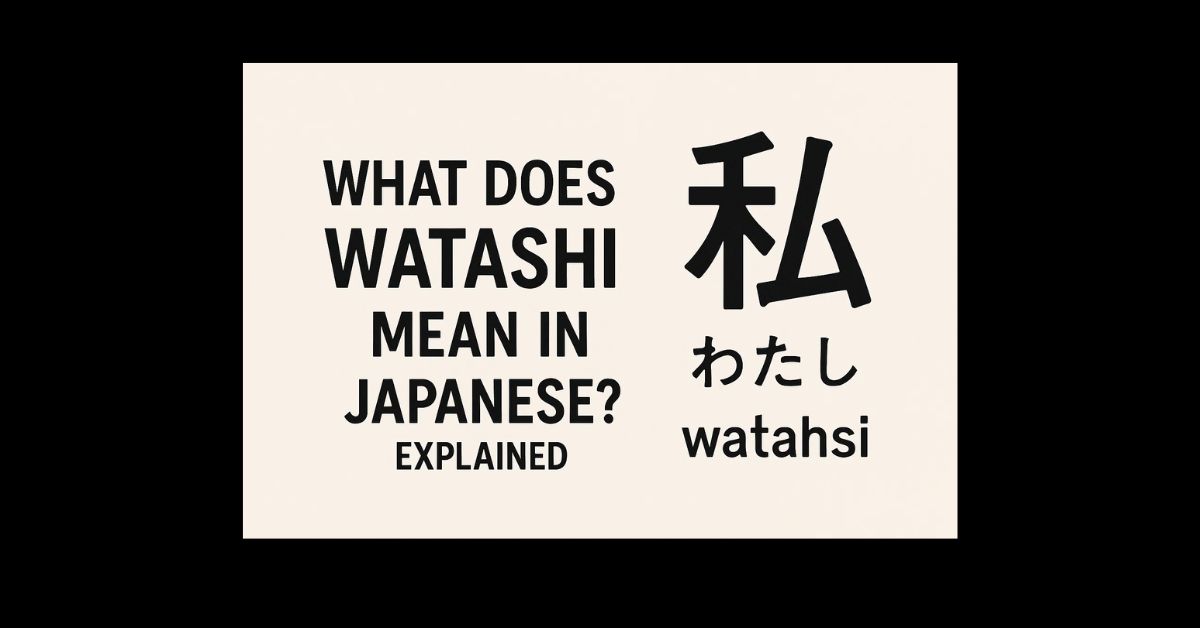In Japanese, watashi (私) is one of the most common words for saying “I” or “me.” It’s polite, gender-neutral, and works well in formal settings like school or work. The watashi meaning in Japanese reflects a respectful way of talking about yourself. If you’re just starting to learn the language, watashi in Japanese is a safe and proper choice. Many beginners use it before traveling to other options like books or ore.
The watashi meaning also helps you understand how important context is in Japanese. While men force switch to boku or ore in casual talk, watashi in Japanese stays popular among women in all situations. It’s especially useful in business or when speaking to strangers. Learning when and how to use watashi is a key part of learning first-person pronouns in Japanese. It also shows your awareness of formality, social roles, and gender expression in the language.
What Does Watashi Mean? The Simple Answer
The watashi meaning is simple; it means “I” or “me” in Japanese. It’s polite and used in formal or respectful conversations. Just like “peace in Japanese” is heiwa, watashi in Japanese shows calm and respectful speech. It’s one of the safest first-person pronouns in Japanese for new learners to use.
The Cultural Significance of Japanese First-Person Pronouns
In Japanese, the way you say “I” shows more than just who you are; it reproduces your manners, mood, and relationship with others. Using words like watashi, boku, or ore depends on your gender, reserve, and the people you’re talking to. This makes choosing the right first-person pronoun in Japanese really important. It’s not just grammar, it’s culture.
- Watashi is polite and respectful in most formal situations
- Boku is casual and often used by younger boys and men
- Ore shows confidence and is used in friendly, informal settings
- Atashi is soft and used by women in casual speech
- Pronouns reflect social status, gender expression, and tone
- Often, Japanese speakers forget pronouns when the subject is clear
Understanding this helps you speak more naturally and respectfully in Japanese. For example, saying “Genki desu ka?” means “How are you?”and your answer might include watashi depending on how formal or casual you want to sound. Knowing the genki desu ka meaning and proper pronoun use builds real connection in conversations.
When to Use Watashi: Context Matters
Formal Settings
In formal situations, watashi in Japanese is the best and safest word to say “I.”
- Business meetings or office conversations
- Speaking with teachers or seniors
- Job interviews or formal introductions
- Public speeches or official events
- Talking to outsiders with respect
- Writing polite emails or documents in Japanese
When someone says “Genki desu ka?”, meaning “How are you?”, replying with watashi wa genki desu sounds respectful and clear. Using watashi in these moments shows good manners and understanding of Japanese formality.
Gender Considerations
In Japanese, the way people use watashi can change depending on whether you are a woman or a man.
For Women
- Women often use watashi in Japanese in both formal and casual situations
- It sounds polite, soft, and is widely accepted in daily conversation
For Men
- Men use watashi in official settings, but may switch to boku or ore with friends
- Using watashi casually can sometimes sound cool or too polite
The watashi meaning in Japanese stays the same “I” or “me” but how and when you use it shows cultural awareness. Learning these differences helps you understand the deeper side of watashi meaning in real Japanese conversations.
Want to explore Japan’s culture?
Start by learning how people speak and express themselves, like using watashi in Japanese. The watashi meaning in Japanese isn’t just “I” it shows respect, politeness, and social awareness. Understanding the watashi meaning helps you connect deeper with Japan’s language and culture.
Variations of Watashi
Watakushi (わたくし)
This extreme-polite form of watashi in Japanese is used in the most respectful and official situations.
- Government addresses
- Royal family events
- Traditional Japanese rituals
- Deep or serious apologies
Example: わたくしは全ての責任を負います。 Watakushi wa subete no sekinin o oimasu. — I accept full responsibility.
Atashi (あたし)
A softer, more casual form of watashi in Japanese, often used in friendly or relaxed conversations.
- Common among young women
- Popular in everyday chats or texts
- Adds a cute or girly touch to speech
- Not typically used in formal situations
Example: あたし、そのカフェが大好き! Atashi、 sono kafe daisuki! I really love that café!
Watashitachi (わたしたち)
This is the plural form of watashi in Japanese, and it simply means “we” or “us” in most situations.
- Used when mentioning to yourself and others together
- Works well in both formal and casual speech
- Suitable for group conversations or introductions
- Easy for beginners to use surely
Example: わたしたちは新しいプロジェクトを始めます。 Watashitachi wa atarashii purojekuto o hajimemasu. — We are starting a new project.
Related Article: Eto Meaning Japanese: Mastering This Common Filler Word
Beyond Watashi: Other Common First-Person Pronouns
Besides watashi in Japanese, there are other ways to say “I,” like boku, ore, and uchi. While the watashi meaning in Japanese is well-mannered and neutral, these words show different tones, like casual or self-confident. Knowing the watashi meaning helps you choose the right word based on reserve and who you’re talking to.
Boku (僕/ぼく)
This word is a gentle way for males to say “I,” often used in relaxed or polite everyday situations.
- Common among teen-age boys and adult men
- Fits casual talk or respectful conversations
- Shows a calm, kind, or humble tone
Example: 僕は読書が好きなんだ。 Boku wa dokusho ga suki nanda. I enjoy reading books.
Ore (俺/おれ)
This bold and casual way of saying “I” is mostly used by men in informal, close settings.
- Popular among male friends and nobles
- Common in relaxed, everyday conversations
- Gives off a self-assured or strong vibe
Example: 俺は明日映画を見に行くよ。 Ore wa ashita eiga o mi ni iku yo. I’m going to watch a movie tomorrow.
Uchi (うち)
A casual and local way to say “I” in Japanese, often tied to group identity or home speech.
- Often used by young women, especially in Kansai
- Feels warm, familiar, and a bit informal
- Can also mention to “our home” or “our group” depending on context
Example: うち、明日バイトあるねん。 Uchi、 ashita baito arunen. I have a part-time job tomorrow.
When Not to Use Pronouns in Japanese
In Japanese, people often skip saying “I” when the meaning is already clear from context. So instead of saying watashi in Japanese every time, they just say the verb or noun… and it still makes sense! This is part of learning natural Japanese speech and avoiding overusing first-person pronouns.
✅ With Pronoun:
私は学生です。
Watashi wa gakusei desu.
I am a student.
❌ Without Pronoun:
学生です。
Gakusei desu.
(I) am a student.
Common Mistakes to Avoid
- ❌ Using element in formal or respectful situations (sounds too rough)
- ❌ Men casually using watashi with close friends (may feel stiff or overly formal)
- ❌ Mentioning to yourself by name as an adult (can sound childish)
- ❌ Overusing watashi in Japanese when it’s not needed (Japanese often drops pronouns)
- ❌ Mixing up watashi meaning in Japanese with other pronouns without knowing the tone
- ❌ Ignoring social context, gender, or reserve when choosing pronouns
Tips for Mastering Japanese First-Person Pronouns
- ✅ Start with watashi — It’s the safest and most polite option for all learners.
- 👀 Watch native speakers — Notice when they use boku, ore, atashi, or skip pronouns.
- 🧠 Think about context — Official or casual? Male or female? Friend or stranger?
- 🚫 Don’t overuse pronouns — In Japanese, it’s natural to drop them when the subject is clear.
- 🎭 Match your tone and image — Choose a pronoun that reflects how you want to sound.
- 🗣️ Practice with real phrases — Try using them in examples like “Watashi wa genki desu” (I’m doing well).
Quick Answers About Watashi Meaning
What is the meaning of watashi in Japanese?
Watashi in Japanese means “I” or “me” and is a polite, gender-neutral first-person pronoun used in formal conversations.
Is watashi used by both men and women?
Yes, watashi is used by both men and women, especially in formal settings. Men often use boku or ore casually.
When should I use watashi instead of other pronouns?
Use watashi in formal or polite situations, like speaking to strangers, teachers, or during business meetings and official settings.
Can watashi mean “we” as well?
No, watashi only means “I” or “me.” To say “we” or “us,” use watashitachi (わたしたち) instead in Japanese.
Is it necessary to use watashi in every sentence?
No, Japanese often forgets watashi when the subject is clear from context. Overusing pronouns sounds unnatural in daily conversation.
When should I use watashi?
Use watashi in Japanese when you want to sound polite, respectful, or when you’re unsure which pronoun is best.
Is watashi just for girls?
No, watashi meaning in Japanese is gender-neutral in formal speech. However, women use it more than men in casual situations.
Conclusion
Understanding the watashi meaning in Japanese is a key step in learning how to speak naturally and respectfully. While watashi in Japanese means “I” or “me,” it also returns your tone, social awareness, and setting. Whether you’re choosing between watashi, boku, or ore, the right pronoun depends on gender, reserve, and relationship.
Learning when to use or skip pronouns makes your speech more fluent. From everyday chats to formal speeches, mastering Japanese first-person pronouns helps you connect more deeply with the language and culture. So next time someone asks, “Genki desu ka?”, you’ll know just how to respond!

